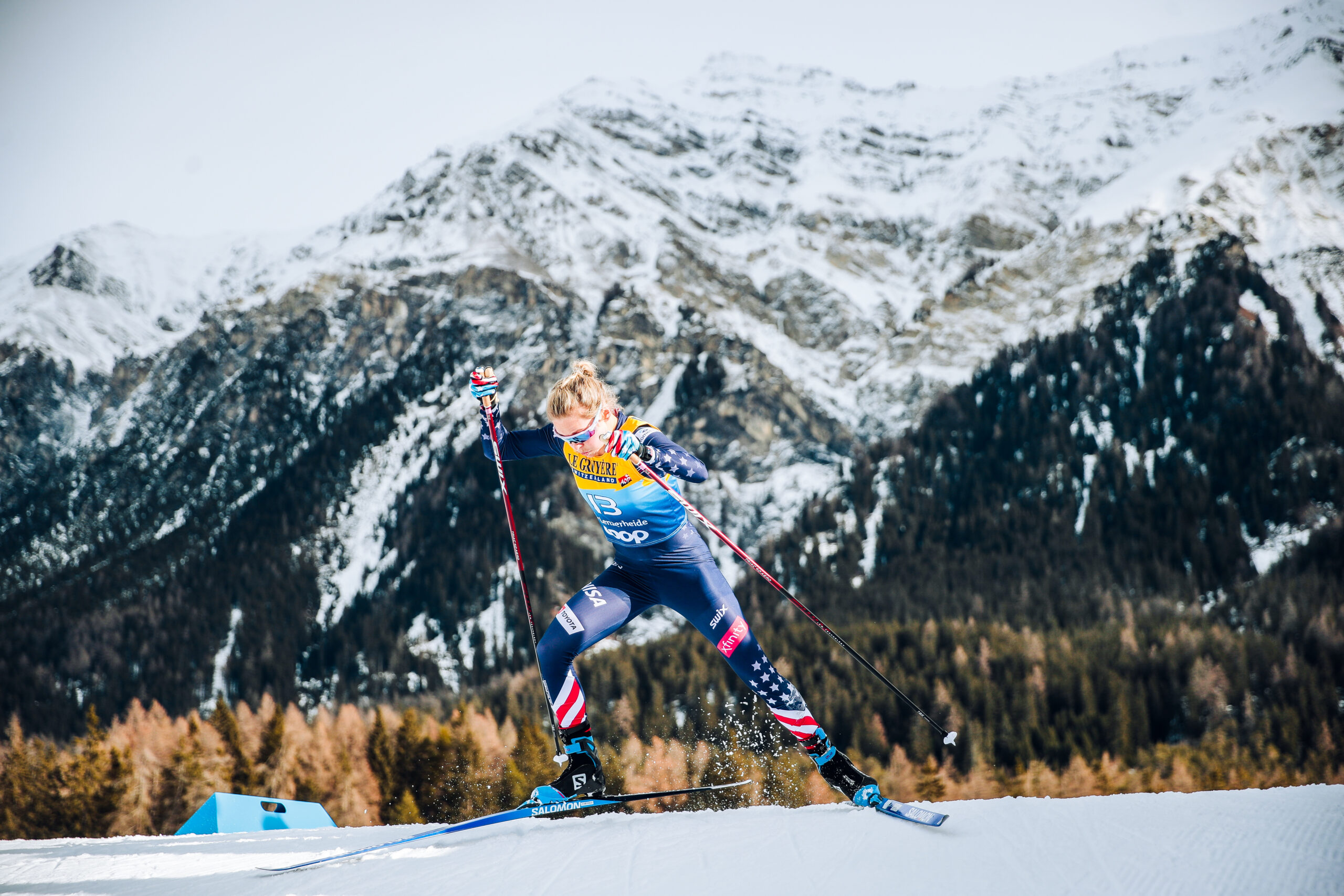Whether this is for better or for worse…I’ve had my fill of writing books for a very long time! But if the days of the Tour de Ski could be accurately described as chapters of a book, it would look something like this.
- Prologue: Thank God We Did That
- Stage 1: Fueled by Smiles and Glitter
- Stage 2: Stay Cool, Yolanda
- Rest day: Invest In Rest
- Stage 3: It’s Not Over Yet
- Stage 4: Be The Goldfish
- Rest day: So You’re Sick: Now What?
- Stage 5: Do No Harm
- Stage 6: Mental Toughness
- Epilogue: (don’t) Read All About It
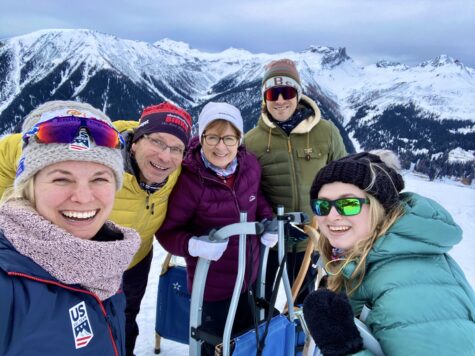
Prologue: Thank God We Did That
When we found out spectators would not be allowed at the Olympics, we made plans for my family and Wade to come join me in Davos over Christmas. I’m so, so thankful that this worked out! For me, this was a very important mental break from a year that has been filled with covid stress and racing stress. Having a week to simply be with my fiancé and family, to love and feel loved and to relax, was wonderful. And, hindsight being 20/20, I’m even more grateful for this time now that the stresses and pressures of the Games are ramping up. I can’t say enough how grateful I am for the unconditional love and support of all the people closest to me, because it means the world!
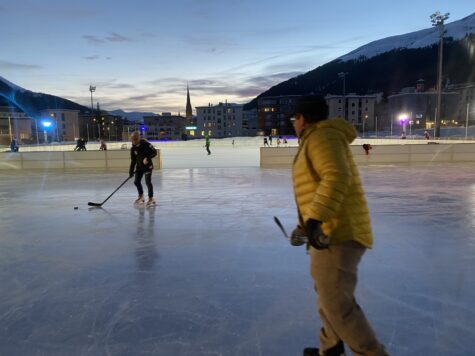
We skied together, skated together, we went sledding (also with my teammates staying in town over the holidays!). We baked tasty cookies, snuggled on the couch, and decorated some gingerbread houses of somewhat questionable construction. I’m so thankful for Wade and my family for dealing with the additional stresses of traveling this year in order to have this special time together!
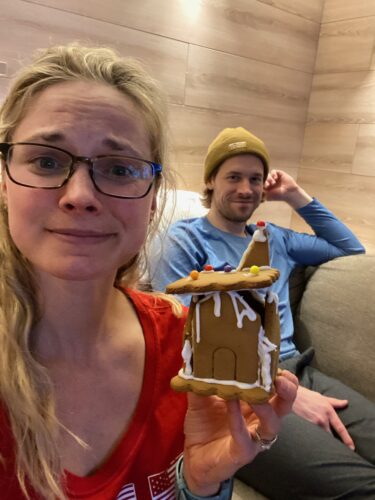
Stage 1: Fueled by Smiles and Glitter
The Tour de Ski opened with a skate sprint in Lenzerheide, and for me, this was an incredibly happy and relaxed day. My Mom, Dad and sister were there to have fun and cheer (Wade had to fly home for work), and instead of adding pressure to perform, this simply helped me remember the important things in life. The whole “happiness is fast” thing is cheesy, I know, but it’s also true for me.
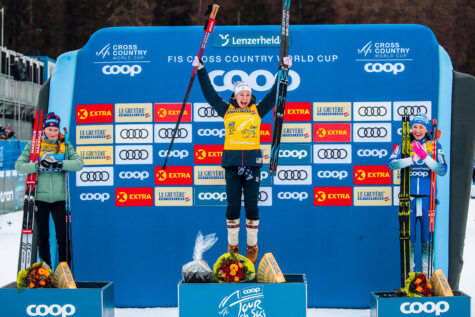
Another reason I was so happy? I love seeing my teammates crush. Hailey was skiing so well before a crash, and that was awesome to see! Julia made the Olympic Team objective criteria that day, and the feeling of seeing a teammate whom I’ve personally watched work their butt off for years achieve a lifelong goal gave me wings.
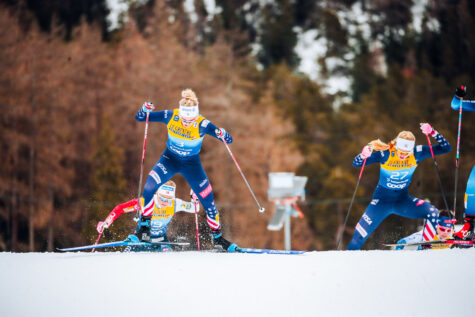

Stage 2: Stay Cool, Yolanda
Snow, rain, wax that worked until 30 minutes to start, rub skis…this was the kind of crazy weather day and potential panic that would have tanked my tour only a few years ago. Instead, we focused in on the process goals, worked methodically to select skis that were going to work, believed like hell that they would, and then raced hard. I crossed the finish line unable to feel my legs, but able to feel very proud indeed of our team.
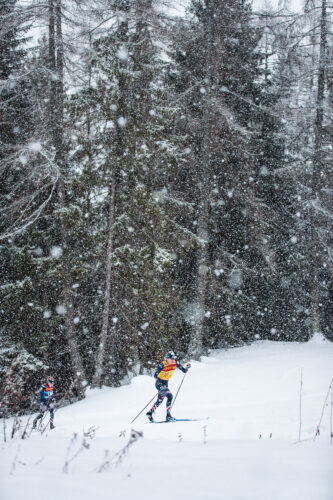
Our wax truck is named Yolanda (long story). I was so, so proud of how the tech team and everyone around Yolanda kept their cool and never once panicked on a truly challenging day, where it would have been easy to do so. To me, that was one of the big moments of the tour.
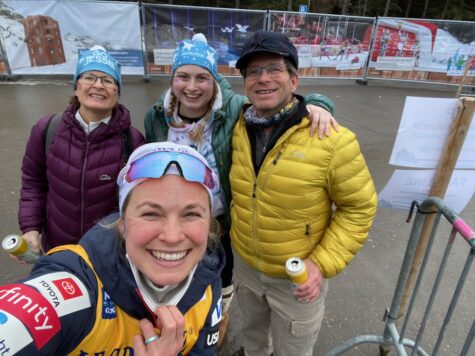
Rest day: Invest In Rest
My family had to fly home after the 10km classic in Lenzerheide, but I stored up some extra hugs and love before they left. When I got my last hug, my Mom slipped a card inside my pocket from my family that had “invest in rest” on the front…incredibly appropriate! So on our travel day to Oberstdorf, that’s exactly what I did. One of the big secrets in the tour for me has been to do as little as possible, whenever possible. Sometimes it’s good to be lazy!
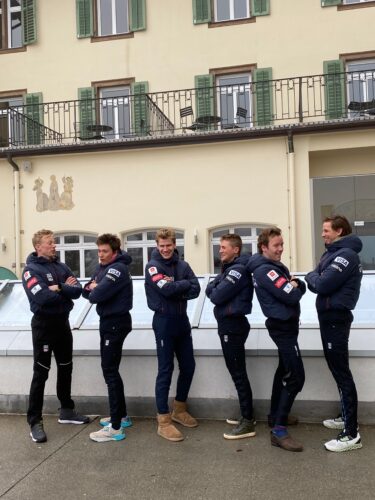
Stage 3: It’s Not Over Yet
The 10km skate mass start in Oberstdorf has, at least historically during the Tour de Ski, stayed together and been a race with many broken poles and crashes. Seeing the salted icy firm course and knowing that it literally might take more energy to draft and deal with chaos than just stay right up front, I tried my best to stay out of the way and ski smart!
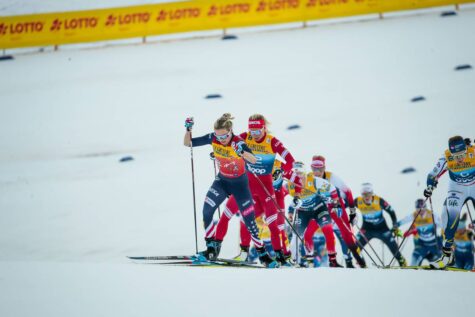
Halfway through the race, I figured out two things; 1.) the right amount of space and over-the-top-of-the-hill push for the most effective slingshot, and 2.) I had the fastest skis in the world, thank you team! Also, the race is never over until the finish line.
I’ve made a lot of mistakes on icy finishing lanes in the past, and this year the Dresden sprint races helped inform the decision to just ditch my poles altogether and skate like it’s hockey! That was some intense lactic acid feelings after that finish line…but rather good feelings in every other way.
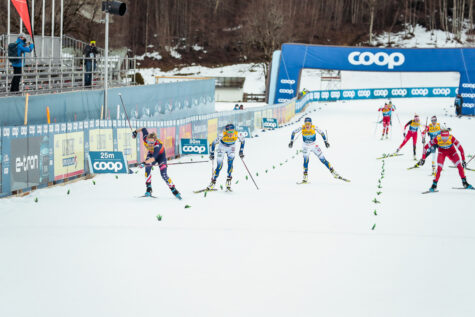
Stage 4: Be The Goldfish
Let’s be real about that classic sprint; it’s not fun when people don’t follow the rules and the end result is your Tour becoming much, much harder. There’s no getting around that. But here’s the thing: you can’t control the actions of the people around you. You CAN control your own actions and energy. What you’re left with is a choice; process and move on as quickly as possible, or let it simmer and steal your energy. And I’ll be honest, it was pretty easy to let go of my frustration when the entire World Cup was angry on my behalf. Nearly unanimous outrage is an incredible thing to witness, and I felt incredibly supported by everyone around me. So…I let it go.
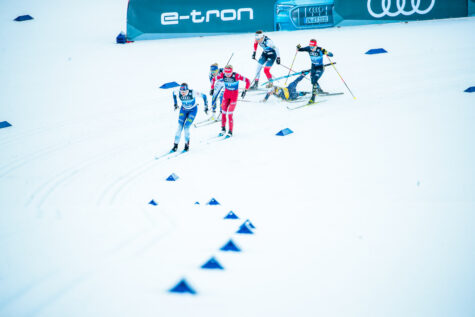
Relentless optimism isn’t just something some people have and others don’t. It’s cultivated. It’s exhausting, sometimes. And it’s probably annoying for the people around you. But I do think it’s extremely helpful!
As Ted Lasso reminds us: “the happiest animal on earth is a goldfish, because it has a 10 second memory. Be the Goldfish”…or something cute and peppy like that. As a fan of dogs, I’d like to challenge the assertion that goldfish are in fact the happiest animals, but I can’t disagree with the short memory idea. Holding onto hurt only hurts. At the end of the day, I was proud of how I conducted myself and how I saved all my energy for what would come next. As it turns out, I really needed it!
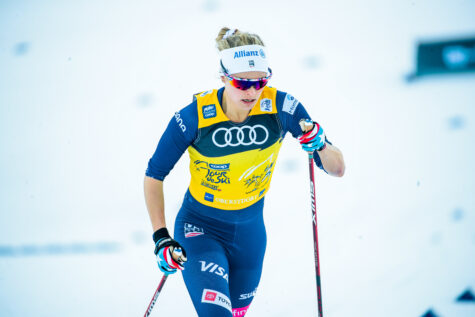
Rest day: So You’re Sick: Now What?
That night, I got sick. Not with covid (we checked, repeatedly). With a head cold that was only in my nose, and felt terrible but was relatively harmless. I stayed in a single room, ate all my meals alone up there, and had a mask on any time I answered the door, let alone went out into the hotel hallway. I tried my very best to keep every single germ to myself!
Here’s the thing: I don’t advocate racing while sick. In fact, 99% of the time I’d advise against it! At best, you’re racing with only 90% of yourself, and you really need 100. At worst, you can make yourself more ill or seriously prolong your recovery. For me, this was a real “know thyself” situation. After meeting with our team doctor and carefully listening to my own body, we decided that if I felt the same or slightly better the next day with nothing in my lungs, it wouldn’t cause further damage to race. I have a long history of recovering quickly from colds, and also of using the Tour de Ski as a huge training tool in preparation for Championship events. I’m the kind of athlete that races better with – wait for it – racing! Finishing the Tour, recovering from the Tour and then training and peaking has never not worked for me, so I felt that this would be worth it for the physical and mental training that I can only get from racing, hard. No, I had no chance of securing a podium in the Tour. That’s ok! It’s not always about winning.
Stage 5: Do No Harm
Well, that hurt! I also expected it to hurt. But I did feel that I made the right choice. I was able to breathe, able to race, able to train my mind to take over when my body wanted to quit. Most importantly, I was in tune with my body the whole day, only racing when it was clear it would do no harm in the big picture. I cooled down from the race, came back to the hotel and climbed back into bed.
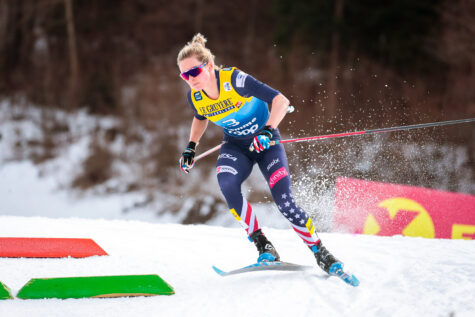
Stage 6: Mental Toughness
I had to make the choice, over and over and over again, to keep moving forward, one stumbling, painful step at a time. I routinely race hard enough that I can’t feel parts (or all) of my legs. When I collapse in the snow after a race where I’ve given it my all, I feel like I’m floating while the world is spinning around me, and I have to hold onto the snow to keep from sliding sideways. Sometimes my vision tints yellow or pink, even when my glasses are clear. My greatest strength in ski racing has always been knowing how to pull more from my body than is reasonable. So when I say that the final climb in this tour was one of the hardest things I’ve ever done…I really mean it.
And that’s exactly why I wanted to do it. Half of my training plan leading into the Olympics included a lot of racing in order to get the physical fitness boost that I’m accustomed to after recovering from the Tour. The other half was the mental toughness boost that can only be earned the extremely hard way. The first time you feel that kind of pain cannot be the one time in your life that it really matters, or you won’t know what to do with it; how to move through it, how to feel it without being consumed by it. After the last two races of this tour, I think my mind is as about as racing-strong as it’s going to get!
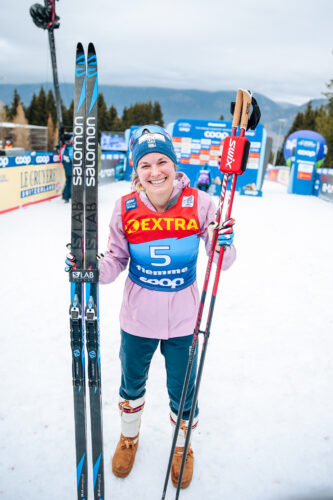
You can feel more than one powerful emotion at once. I had the really cool experience of being simultaneously in a ton of pain and faced with the exhausting job of repeating to myself that I would, in fact, make it to the top alive…while also feeling my heart burst with pride and excitement seeing Sophia and Novie pass me by on their way to their career-best World Cup races! I’ve learned that both things can be true: you can be having a rough day yourself but also feel real joy on behalf of your teammate at the same time. I think this is why we have a team. There will always be someone and something to celebrate, even if it’s not you that day. And if you’re someone who gives a lot of yourself to the team, it gives right back to you. You know that you’re a small part of their great race that day, and they are a part of why you’re able to drag your aching body across the finish line.
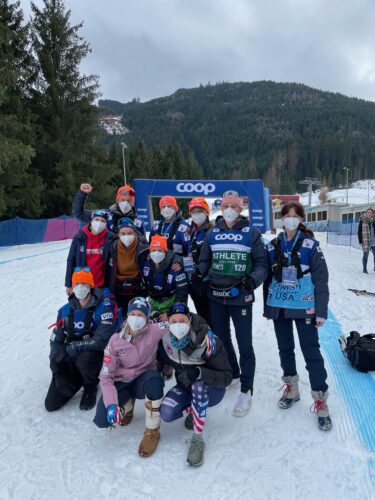
This feeling extends internationally as well – the uplifting feeling of support and belonging isn’t something I feel only within my own team. I shared a lot of really great moments with other athletes from other countries during the Tour, and these friendships and moments are so important to me. When I wasn’t fully conscious lying in the snow after the finish line, Nadine pulled off my skis and poles and scraped me up off the snow. As I was stumbling out, Krista and I had a really awesome chat. One of my friends from the Norwegian team told me she would be breathing with me every step of the way when it got hard, and I felt that love when I needed it (thank you, Kari). As it turns out, the actual racing is the least important thing that ski racing has brought to my life.
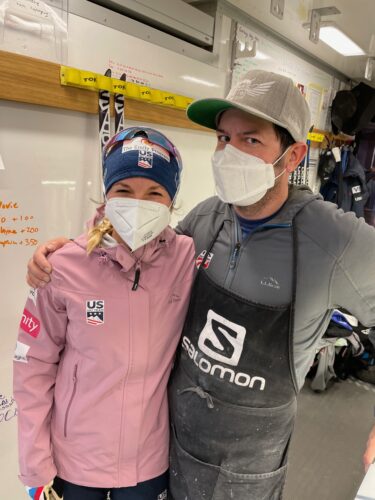
Epilogue: (don’t) Read All About It
It is not only completely understandable to me, but more or less expected under the circumstances that athletes before, during and after the Olympics often suffer from mental health issues. The amount of pressure placed on my shoulders has not been easy and has been building for four years, and I don’t even consider myself close to a favorite! My point here is that this is hard; the Olympics are exciting and big and inspiring, but they are also a pressure-cooker (and that was true even before Covid)! For me, it is always better to simply acknowledge that there is a mix of emotions going on here; not all positive and not all negative. And that sometimes it’s ok for it to not feel ok!
As someone who has struggled with an eating disorder in my past, it’s so important for me to be able to honestly say how I feel and not have to pretend things are “fine, thanks! Just fine!” if they are not. I have so many amazing, supportive people in my life who I know will have my back no matter how I’m really doing. Trust falls only work if you trust that you’ll be caught before you hit bottom. So headed into an Olympics with a lot of expectations and pressure on my shoulders, I’m also heading in with a big-ass blindfold and earplugs to block out the extra noise. I’m that confident in my team helping me stay together and stay focused on the things I can control. Side note: thank you team. I really, really love you with all my heart.
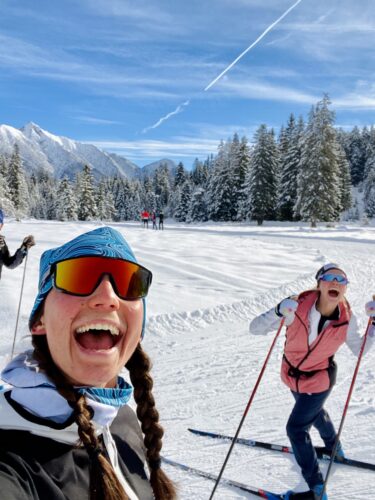
One of the things I’ve learned is this: just because someone moves the goal posts for you doesn’t mean you need to change them for yourself. Especially around the Olympics, World Cup Overall or Tour de Ski overall discussions, there is a lot of messaging saying that anything less than winning is failure; and if you don’t have a chance at winning it all, you might as well not try. If you try but don’t win, then you’ve let people down. Why put your heart on the line for something you can’t be sure you can have?
But I don’t believe that for a second. Yes, you get hurt more often when you put your heart and soul out there for others to see. Trying with all you’ve got takes a lot of guts, because it hurts more when you don’t get it. And yet. Living with passion, taking big swings and realizing that you can live through the times you miss is part of growing. Going through life in such a way that you’ll never have to ask yourself “what if” is a pretty awesome way to be. It is important for me to define what “success” looks like, and for me, that has never been correlated to the results sheet. The most important people in my life don’t define success that way either, which is the best gift one could ask for.
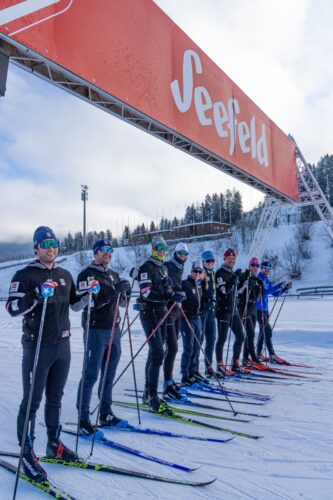
The other thing I’ve learned? Seriously limiting or avoiding consuming any media about ski racing can help me find balance in my life. So much of my day is all about racing and skiing, it’s nice to have a few degrees of separation when the race is over. It’s important to seek out that balance!
So where are we now? In Seefeld, soon headed to Livigno, aggressively bubbled up in apartments, doing our very best to stay safe and covid-free in a crazy world. Eating amazing food thanks to Chef Cada, getting our muscles worked on by Anna our PT, and recovering well from the Tour! 2 days after the Tour ended I was symptom-free and feeling better, and a few days later feeling normal and 100% healthy in training again. Perhaps most importantly, I’m excited to be training, listening to my body, and preparing for the Olympics in the best way I know how with the support of my awesome coaches and teammates.
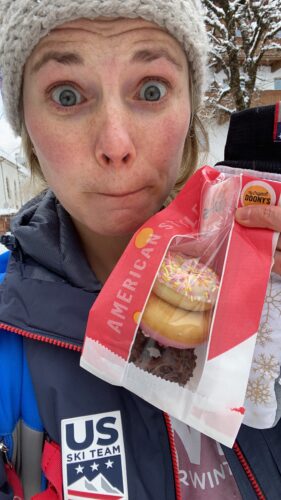
I’m getting excited for the Games to begin soon, but as usual, just focused on the day to day process of doing the best that I can each day so I know I can roll into the Olympics having done all that I can!

